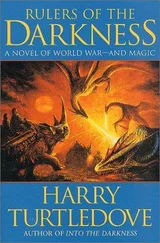Costache turned and put her arms around him. “And how are things from in front?” she asked.
Things from in front were fine. In its generosity, the kingdom of Sibiu had furnished them with two military cots, which they’d pushed together. With Cornelu and Costache both eager, the cots might have been a fine, soft bed at a fancy hostel. Before long, his wife gasped and quivered beneath Cornelu. Her belly grew hard and firm as her womb tightened during her spasm of pleasure. Cornelu spent himself a moment later.
He didn’t let his weight down on her, as he would have before she was with child. “We won’t be able to do it like that much longer,” he said, and set a hand on her belly to show why. “Someone in there is getting in the way.” As if indignant, the baby kicked. Cornelu and Costache both laughed, as content as any two people could be during wartime.
Pekka was working, and working hard, though no one could have proved it by looking at her. She sat at the desk in her office at Kajaani City College, staring out the window at the driving rain. Every once in a while, her eyes would slip down to the sheets of paper spread across the desk.
Once, as the rain kept drumming down, she reached out, inked a pen, and wrote a couple of lines below what was already on the last of the sheets. She didn’t look at them again for several minutes. When she did, she blinked in surprise, as if someone else’s hand, not her own, had done that writing.
Partly recalled to herself, Pekka wondered what the students in her theoretical sorcery class would think if they could see her now. They would probably laugh like loons. Comics had been making jokes about absent-minded mages since the days of the Kaunian Empire. Some of the Kaunian jokes had survived to the present day, and sounded remarkably like their modern equivalent. Some of them had doubtless been ancient in Kaunian times, too.
And then Pekka drifted away again, back into the haze of concentration that was the next thing to a trance. She noticed the rain only as background noise. Somewhere down at the root of things, the laws of similarity and contagion were connected. She was morally certain of it, though wizards had been treating them as separate entities for as long as men had been working magic. If she could link them together…
She had no idea what would happen if she could link them together. She would know something she hadn’t known. She would know something no one in the world had ever known. That was enough. That was more than enough.
She scribbled another line. She wasn’t close to an answer. She had no idea how long she would need to get close to an answer. She was getting closer to designing a sorcerous experiment that might tell her whether she was on the right track.
Someone knocked on the door. Pekka did her best not to hear. Her best was not good enough. She’d been about to write another line. Whatever she’d been on the point of setting down vanished from her mind.
Fury roared in to take its place. Kuusamans were as a rule easygoing, especially when set alongside the proud and touchy folk of the kingdoms of Algarvic stock. But every mage had to keep in mind the difference between the rule and the exception.
Springing to her feet, Pekka dashed to the door and flung it wide. “What are you doing interrupting me?” she screeched, even before it had opened all the way.
Her husband, fortunately, lived up to the Kuusaman reputation for calm. “I’m sorry, dear,” Leino said. His narrow eyes didn’t widen; no surprise showed on his broad, high-cheekboned face. He’d seen Pekka burst like a large egg before. “It is time to head home, though.”
“Oh,” Pekka said in a small voice. The real world returned with a rush. She wouldn’t unify contagion and similarity this afternoon, nor even figure out how to take that one step closer to finding out whether unifying them was even possible. With the real world’s embrace came acute embarrassment. Looking down at her shoes, she mumbled, “I’m sorry I shouted at you.”
“It’s all right.” Leino’s shrug made water drip from the brim of his hat and the hem of his heavy wool rain cape; his office was in a different building from Pekka’s. “If I’d known you were thinking hard, I’d have stood out here a while longer. We’re not in that big a hurry, not that I know of.”
“No, no, no.” Now Pekka turned briskly practical. She was that way most of the time: except when thinking hard, as her husband put it. She pulled on rubber overboots, took her cap from the peg on which it hung, and jammed her own broad-brimmed hat down over her straight black hair. “You’re right—we’d better get back. My sister’s been trying to corral Uto long enough—I’m sure she’d say so.”
“She loves him,” Leino said.
“I love him, too,” Pekka said. “That doesn’t mean he isn’t a handful—or two handfuls, or three. Come on. We can catch the caravan at the edge of the campus. It’ll take us most of the way there.”
“Good enough.” Amusement danced in Leino’s eyes: watching Pekka go in the space of a few breaths from wooly-headed scholar to a planner who might have served on the Kuusaman General Staff never failed to tickle him.
Raindrops pelted down on Pekka as soon as she stepped outside. She hadn’t gone ten paces before her hat and cape were as wet as Leino’s. She ignored the rain in a different way from the one she’d used while off in the realm of theory back in her office. Any Kuusaman who couldn’t ignore rain had had the misfortune of being born in the wrong land.
“How was your day?” she asked, squelching along beside her husband.
“Pretty good, actually,” Leino answered. “I think we’ve made a breakthrough on strengthening behemoth armor against beams from heavy sticks.”
“They’ve had you working on that for a while,” Pekka said. “I haven’t heard you talk about breakthroughs before.”
“This is a whole new idea.” Leino looked around to make sure no one was close enough to overhear before going on, “Ordinary armor’s just iron, of course, or steel. It can reflect a beam if it’s polished enough, or spread the heat around so the beam won’t burn through if it doesn’t stay right in the same spot long enough.”
Pekka nodded. “That’s how people have always done it, sure enough. You’ve found something different?” She cocked her head to one side and looked at her husband with approval, glad she wasn’t the only one in the family straying off the beaten track.
“That’s what we’ve done, all right.” Leino also nodded, enthusiastically. “It turns out that, if you make a sort of sandwich of steel and then a special porcelain and then steel again, you get armor that’s a lot stronger than what we’re using now without weighing any more.”
“You don’t mean a sandwich with three separate layers, do you?” Pekka asked with a small frown. “I can’t think of any kind of porcelain so special that it wouldn’t be easy to break in large, thin sheets.”
“You’re absolutely right. I think that’s why nobody’s taken this approach before,” Leino said. “The trick is sorcerously fusing the porcelain to the steel on either side of it, and doing it so we don’t wreck the temper of the steel in the process.” He grinned at her. “We’ve wrecked a lot of other tempers in the process, I’ll tell you that. But now I think we’re getting the hang of it.”
“That will be good,” Pekka said. “It will be especially good if we get drawn into the madness on the mainland of Derlavai.”
“Aye, though I hope we don’t,” Leino said. “But you’re right again—not much place for behemoths in the island-hopping kind of war we’re fighting against Gyongyos.”
Читать дальше












